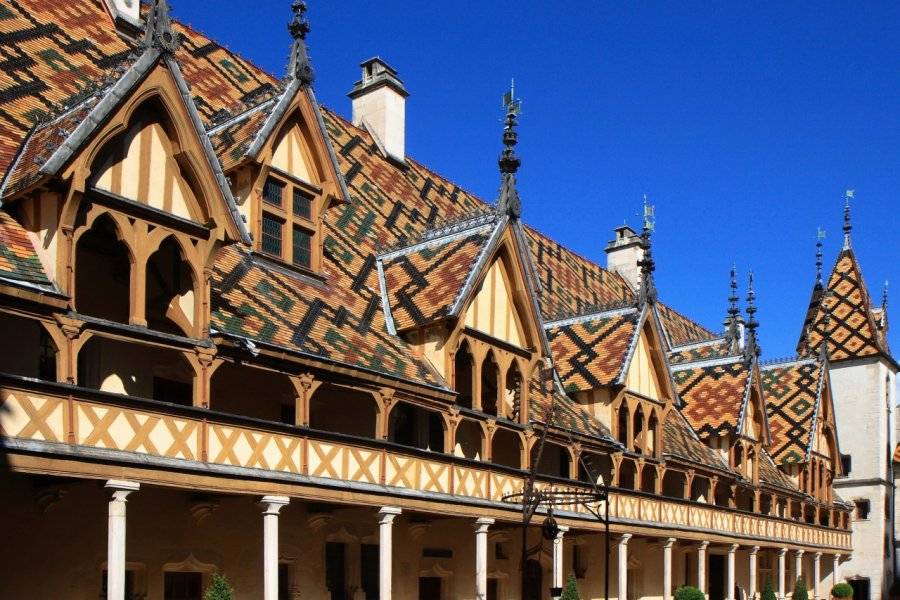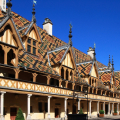Hôtel-Dieu de Beaune, a jewel of flamboyant gothic architecture with polychrome roofs and collections of earthenware and pewter.
On the route des grands crus, this is one of Burgundy's must-sees. Nicolas Rolin and Guigone de Salins, the founders of the Hôtel-Dieu, tell you the story of this six-century-old hospital. You have to pass through the porch to discover the splendor of the place. Even if you've visited this prestigious French historic monument several times before, you'll never cease to be amazed. Its flamboyant Gothic architecture, breathtaking polychrome roofs and renowned vineyards make this museum a jewel of Burgundy. A little history to better understand: Chancellor Nicolas Rolin and his wife Guigone de Salins are the founders of the Hospices. Their founding charter, dated August 4, 1443, provided for, among other things, "the distribution of white bread to the poor of Jesus Christ asking for alms". To put this into historical context, the long 100-year war had just ended, a period of great unrest and misery. In addition, the plague had decimated the countryside. During his stays in Flanders, of which the Duke of Burgundy was suzerain, Nicolas Rolin was inspired by the architecture of hospitals in the North to design his hospital. He called on local craftsmen to build his Palais pour les Pôvres. And so, in Beaune, an architecturally remarkable Hôtel-Dieu was built to serve the poorest of the poor! The building was used for this purpose until 1971, when it was converted into a museum. Today, the Hôtel-Dieu is part of a complex known as the Hospices Civils de Beaune. This includes the Hôtel-Dieu and its museum, the Nicolas Rolin hospital, a retirement home, a nursing school and a vineyard. In terms of architecture, the Gothic façade of Beaune's Hôtel-Dieu is a symbol of Burgundy. Its medieval style is inspired by the aesthetics of Flanders, then under the domination of the Duchy of Burgundy. The roof is covered with brightly-colored glazed tiles, creating a resplendent picture in the sunlight! Beneath this beautiful roof, the harmonious organization of the buildings governs the life of the charitable institution: under a 15th-century wooden barrel vault, the Salle des Pôvres is at its heart. Here, the sick are welcomed and cared for. The kitchen, with its vast Gothic fireplaces, is presented as it was in the early 19th century. The highlight is the automated roasting spit dating from the late 17th century. In the apothecary, shelves display mortar, flasks, vials and earthenware pots in which the ingredients used to create remedies were stored. This is the sanctuary of all sorts of potions and ointments: woodlouse powder, crayfish eyes, vomitus nut powder... It's easy to imagine the comings and goings of the nuns and the sound of their hooves on the cobblestones. Gérard Oury's cult film La Grande Vadrouille offers a romantic version of life at the Hôtel-Dieu, but the film continues to ensure its fame more than 60 years later. Cult scenes with Bourvil and Louis de Funès, Big Moustache, Sister Marie-Odile...
The tour continues with the rooms that housed patients from 1452 to the 20th century, and the Last Judgment polyptych, a mid-15th-century masterpiece commissioned from Rogier van der Weyden, one of the great masters of Flemish painting. Originally exhibited in the Chapelle des Pôvres for patients to admire, the altarpiece now benefits from a dedicated room. Wealthy donors have given the museum a collection of 17th-century wall paintings, chests and tapestries from the 15th to 17th centuries.
In 1457, Guillemette Levernier donated the first vines to the Hospices and this tradition continued for 5 centuries. Today, the winegrowing estate boasts 60 ha under organic cultivation since the 2022 vintage. 50 ha are planted with Pinot Noir, 10 ha with Chardonnay. The estate's parcels are located in exceptional Premier Cru and Grand Cru appellation areas. In all, 85% of the estate's Premier Crus and Grand Crus are sold at auction every third Sunday in November. The sale, long organized by Christie's, is now staged by Sotheby's. Hundreds of bidders battle it out in the Beaune hall or over the Internet to acquire the pieces on sale. This is the most famous charity wine auction in the world. Proceeds from the sale go towards improving the hospital's facilities and preserving the Hôtel-Dieu's heritage.
The 2024 season, under the banner of charity, offers a wide-ranging program of tours, exhibitions, concerts, shows and workshops for all publics. Ask for the 2024 season program "Charité", agapé in Greek or caritas in Latin, one of the essential values of this institution: caring for and sharing with others. Choose your visit: let your senses guide you as you handle care objects and collection pieces, discover the exhibition in tribute to the sisters, meet healthcare professionals who worked at Hôtel-Dieu, take part in well-being workshops. Are you a night owl? Take part in the new Nuits étoilées. Are you a gambler? In the evening, find the antidote that will save the apothecary sister from poisoning. This escape game is a must-see novelty in 2024.
This establishment is also referenced as :
Members' reviews on THE HÔTEL-DIEU OF BEAUNE












